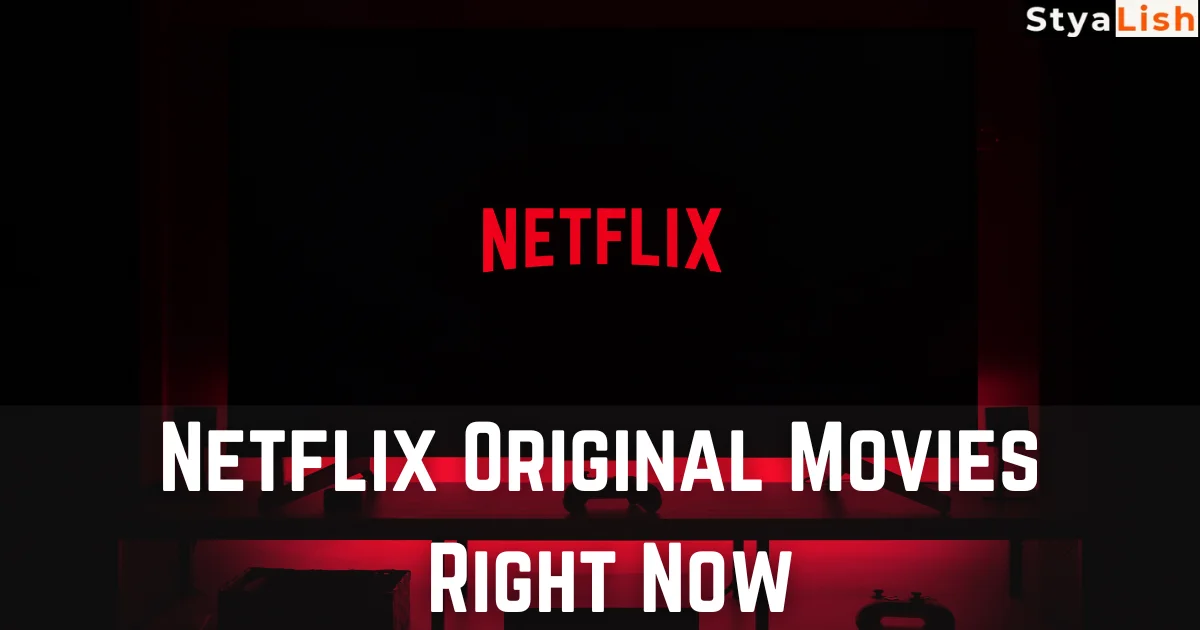The first season of Shark Tank is a wide range of innovative products, from nutritious ice cream to eccentric shoes. Popularity for the first season of Shark Tank India was high thanks to the show’s judges and viral content. Let us check the big brands after shark tank via this blog.
The financial reality program, now in its second season, continues to draw in a sizable audience. But on the business side, certain companies and start-ups saw a considerable gain in valuation and public image thanks to the show’s increased exposure.
Big brands after Shark Tank India
Some important big brands after shark tank are as follows:
-
Tags Foodz
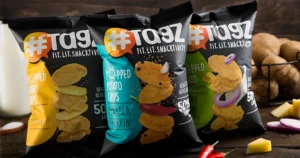
It’s possible that Lays and Kurkure still have a firm grasp on the Indian chip business. Still, healthier options are gaining traction in the country’s major cities, with companies like Lays introducing a baked line of chips and newer companies like Too Yumm and Tagz Foodz entering the fray.
Tagz Foodz, whose main product is “popped” chips that are healthier than regular chips, already has distribution networks in 20 cities and is selling in Kuwait and Australia. Since agreeing to a contract of Rs 70 lakh (with 2.75% equity), Tagz’s growth has multiply by three. This can be one of the big brands after shark tank.
-
Auli Lifestyle
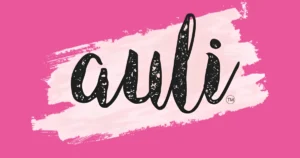
Aishwarya Biswas, the founder of Auli, convinced Shark Namita Thapar to invest in her business, leading to the launch of Auli’s retail distribution. As a result, the monthly assessment for Auli Lifestyle’s line of vegan, ayurvedic skincare basics has increased from Rs 30 to Rs 37 lakh (earlier had a monthly sale of Rs 10-12 lakh). This is indeed one of the best big brands after shark tank.
-
The Sass Bar

Cupcakes and ice cream-shaped soaps are made by hand at The Sass Bar, where all wares appeal to the eye. Since the company struck a contract on Shark Tank India, monthly revenues have increased from Rs 6 lakh to Rs 10-20 lakh. This is unique from the big brands after shark tank list.
-
Skippi Ice Pops
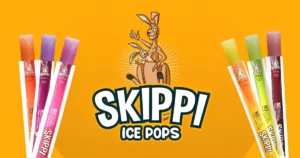
Made with reverse osmosis (RO) water and all-natural flavors and colors, Skippi Ice Pops were the first in India. In addition, the startup was the first to receive funding from all five “sharks” on the pilot episode of Shark Tank India.
The corporation gave the brand $1.6 million for a 15% ownership stake. After appearing on Shark Tank, the company announced that monthly revenues had increased to 2 crores and that it was handling more than 20,000 online orders each month.
Like the popsicles marketed by the Indian company FruitChill, the “stickless” popsicles manufactured under the Skippi Ice Pops brand are available in convenient, individually wrapped packaging. However, Skippi could still stand apart thanks to its eye-catching packaging and summer-friendly flavors, making it the first startup to receive backing from all of the Sharks.
From a monthly revenue of $4,000 to $6,000 five years ago, Skippi has grown to a monthly income of Rs 70 lakh. The firm has also begun sending its frozen goods to international markets like Nepal, Kuwait, Hong Kong, and Uganda.
-
Namhya Foods
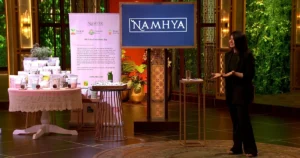
When Ridhima Arora helped care for her ill father, hepatic cirrhosis, she also started the company that would become Namhya Foods. Like him, she left her work and returned to her native Jammu.
On Shark Tank India, Namhya made a transaction for 50 lakhs with 10% equity. Distribution facilities for the brand will soon be set up in the United Arab Emirates, the United Kingdom, the United States, and Canada, and it has already set a monthly sales record of 40 lakhs.
Promoting healthy, all-natural superfoods was a prominent theme throughout the first season of Shark Tank India. And Namhya Foods is no different, albeit it stands out because of its dedication to the traditional Indian methods of using specific herbs.
Namhya has secured a monthly sales record of Rs 40 lakh after concluding a deal of Rs 50 lakh with 10% equity, and the company plans to build distribution centers in the United Arab Emirates (UAE), the United Kingdom (UK), the United States (US), and Canada.
-
BrainWired
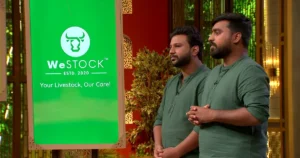
Brainwired, an agrotech firm, was co-founded by Sreeshankar S. Nair and Romeo P. Jerard to address the need for low-price tracking and monitoring animal health methods. Namita Thapar, Peyush Bansal, Aman Gupta, and Ashneer Grover, four “sharks,” were convinced to spend 60 lakhs each in exchange for a 10% interest in the company by its founders.
Monthly sales have reportedly climb to an average of 35 lakhs, and the company plans to export to other countries soon.
During Season 1, the agricultural tech company BrainWired presented a cattle health monitoring and tracking system called WeSTOCK, widely praised for its innovativeness. The BrainWired team is increasing monthly revenues from 1 lakh to 35 lakhs after receiving a deal of 60 lakhs in exchange for 10% of the company.
-
Get-A-Whey

Get-A-Whey strives to manufacture ice cream that is higher in protein, lower in calories, and sugar-free. On Shark Tank India, the Sharks are in impression by the presentation and the range of tastes they offer.
Vineeta Singh, Aman Gupta, and Ashneer Grover propose an investment of 1 crore to the company in exchange for 15 percent ownership. Jimmy and Jash Shah, a mother-and-son team, are the brains behind the startup, which has seen its sales soar to 80 lakhs and one crore.
Get-A- Whey’s low-cal, sugar-free ice creams were an instant hit with the Sharks due to the variety of flavors and attractive packaging. In January, they reported monthly sales of Rs 20 lakh. Now that the show has aired on Shark Tank India, this figure has climb to over Rs 1 crore from earlier estimates of Rs 80 lakh.
-
Hammer Lifestyle
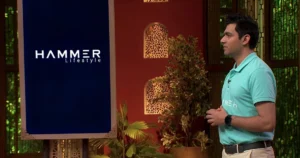
An event where one of the judges is the creator of the domestic speaker behemoth boAt is appropriately timed for the innovative gadget/speaker brand Hammer to increase sales (Aman Gupta) significantly. They also sell electric toothbrushes, smartwatches, grooming items, and a tonne of other stuff.
Since winning a deal at the expo, Hammer Lifestyle has grown its workforce and invested in cutting-edge equipment. As a result, their monthly sales have risen from Rs 70 lakh to Rs 2 crore. Multiple revenue options are available for this brand.
-
Nomad Foods
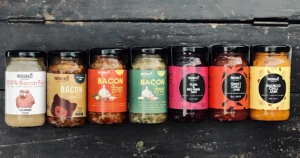
Bacon-only brands can be problematic in countries where chicken and mutton are more popular among consumers. Aditya Rai and Advaith Inamke, who met in college and eventually went into business together, appeared on Shark Tank. They promoted their company, Nomad Foods, which produces and sells bacon the chase (a spicy chutney-like condiment), jams, and spreads.
Before appearing on Shark Tank, they took about Rs 5 lakh monthly in revenue. The current monthly sale after the shark tank is Rs 19 lakh. This brand is known to have multiple revenue streams.
-
Quirky Naari
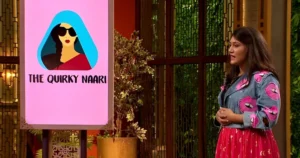
Malvica Saxena, a resident of Mathura, introduced the country to Quirky Naari, India’s first hand-painted denim business, on Shark Tank India. The line includes garments and footwear with a distinct sense of style.
The brand was pretty forward-thinking due to the personalization options and Instagram presence. Since closing a deal of 35 lakhs with 15% equity, the brand’s monthly sale after the shark tank has increased to as much as five lakhs, and it has begun receiving international orders.
Mathura-based founder Malvica Saxena pitched her hand-painted denim firm Quirky Naari on Shark Tank, along with various quirky creative footwear (including LED shoes) and accessories. This brand has multiple revenue streams. You can check Anupam Mittal’s investment in shark tank India.
-
KG Agrotech
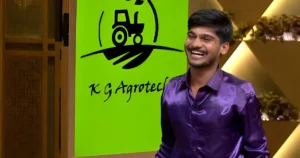
One of the highlights of the first season of Shark Tank India was when Peyush Bansal and Kamlesh discussed the current situation of loans in the nation. Bansal provided him with a 10 lakh investment for 40% equity and a 20 lakh interest-free loan, which he could use immediately.
He co-founded KG Agrotech with his nephew Naru, and both received their education at LensKart Academy. His innovative methods are currently helping farmers on a modest basis. The sale after the shark tank for this one has considerably increased.
Final Words
We have seen above the list of big brands after shark tank. The Indian version of Shark Tank was a significant worldwide discussion topic in 2016. We were all hooked to our screens for updates on the firms, pitches, and sharks. Even though there were far too many creative presentations and brands to feature at the event, only a few had tremendous success due to their exposure there.





